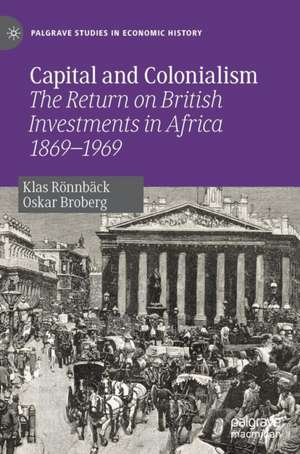Capital and Colonialism: The Return on British Investments in Africa 1869–1969: Palgrave Studies in Economic History
Autor Klas Rönnbäck, Oskar Brobergen Limba Engleză Hardback – 30 iul 2019
| Toate formatele și edițiile | Preț | Express |
|---|---|---|
| Paperback (1) | 699.77 lei 43-57 zile | |
| Springer International Publishing – 14 aug 2020 | 699.77 lei 43-57 zile | |
| Hardback (1) | 711.56 lei 43-57 zile | |
| Springer International Publishing – 30 iul 2019 | 711.56 lei 43-57 zile |
Din seria Palgrave Studies in Economic History
-
 Preț: 497.34 lei
Preț: 497.34 lei -
 Preț: 358.22 lei
Preț: 358.22 lei - 15%
 Preț: 580.36 lei
Preț: 580.36 lei - 20%
 Preț: 939.29 lei
Preț: 939.29 lei -
 Preț: 292.28 lei
Preț: 292.28 lei - 17%
 Preț: 361.80 lei
Preț: 361.80 lei -
 Preț: 357.89 lei
Preț: 357.89 lei - 20%
 Preț: 690.48 lei
Preț: 690.48 lei - 17%
 Preț: 361.39 lei
Preț: 361.39 lei - 18%
 Preț: 945.79 lei
Preț: 945.79 lei - 18%
 Preț: 1012.53 lei
Preț: 1012.53 lei - 15%
 Preț: 700.29 lei
Preț: 700.29 lei - 18%
 Preț: 782.42 lei
Preț: 782.42 lei -
 Preț: 232.82 lei
Preț: 232.82 lei - 15%
 Preț: 644.82 lei
Preț: 644.82 lei -
 Preț: 384.31 lei
Preț: 384.31 lei - 15%
 Preț: 587.85 lei
Preț: 587.85 lei - 18%
 Preț: 899.21 lei
Preț: 899.21 lei - 18%
 Preț: 786.66 lei
Preț: 786.66 lei -
 Preț: 397.97 lei
Preț: 397.97 lei -
 Preț: 388.90 lei
Preț: 388.90 lei - 18%
 Preț: 737.57 lei
Preț: 737.57 lei -
 Preț: 387.20 lei
Preț: 387.20 lei - 15%
 Preț: 647.73 lei
Preț: 647.73 lei - 15%
 Preț: 646.62 lei
Preț: 646.62 lei -
 Preț: 419.06 lei
Preț: 419.06 lei - 15%
 Preț: 459.06 lei
Preț: 459.06 lei - 15%
 Preț: 712.22 lei
Preț: 712.22 lei - 18%
 Preț: 787.47 lei
Preț: 787.47 lei - 18%
 Preț: 1128.57 lei
Preț: 1128.57 lei - 18%
 Preț: 949.55 lei
Preț: 949.55 lei - 15%
 Preț: 471.53 lei
Preț: 471.53 lei - 15%
 Preț: 640.88 lei
Preț: 640.88 lei - 18%
 Preț: 898.26 lei
Preț: 898.26 lei - 18%
 Preț: 1394.21 lei
Preț: 1394.21 lei -
 Preț: 422.90 lei
Preț: 422.90 lei - 18%
 Preț: 955.40 lei
Preț: 955.40 lei - 18%
 Preț: 730.47 lei
Preț: 730.47 lei - 18%
 Preț: 783.98 lei
Preț: 783.98 lei - 18%
 Preț: 900.01 lei
Preț: 900.01 lei - 18%
 Preț: 896.08 lei
Preț: 896.08 lei - 15%
 Preț: 705.83 lei
Preț: 705.83 lei - 18%
 Preț: 787.15 lei
Preț: 787.15 lei - 15%
 Preț: 704.69 lei
Preț: 704.69 lei - 18%
 Preț: 1112.48 lei
Preț: 1112.48 lei
Preț: 711.56 lei
Preț vechi: 837.13 lei
-15% Nou
Puncte Express: 1067
Preț estimativ în valută:
136.20€ • 147.99$ • 114.48£
136.20€ • 147.99$ • 114.48£
Carte tipărită la comandă
Livrare economică 21 aprilie-05 mai
Preluare comenzi: 021 569.72.76
Specificații
ISBN-13: 9783030197100
ISBN-10: 3030197107
Pagini: 326
Ilustrații: XVI, 402 p. 42 illus., 7 illus. in color.
Dimensiuni: 148 x 210 mm
Greutate: 0.83 kg
Ediția:1st ed. 2019
Editura: Springer International Publishing
Colecția Palgrave Macmillan
Seria Palgrave Studies in Economic History
Locul publicării:Cham, Switzerland
ISBN-10: 3030197107
Pagini: 326
Ilustrații: XVI, 402 p. 42 illus., 7 illus. in color.
Dimensiuni: 148 x 210 mm
Greutate: 0.83 kg
Ediția:1st ed. 2019
Editura: Springer International Publishing
Colecția Palgrave Macmillan
Seria Palgrave Studies in Economic History
Locul publicării:Cham, Switzerland
Cuprins
Chapter 1: Introduction.- Part I: Research design.- Chapter 2: Historical context.- Chapter 3: Capital and colonialism in theory.- Chapter 4: Previous research.- Chapter 5: Method and data.- Part II: Aggregate results.- Chapter 6: The rate of return on investment in Africa.- Chapter 7: Risk and return.- Part III: Regional studies.- Chapter 8: North Africa.- Chapter 9: West Africa.- Chapter 10: Central/Southern Africa.- Chapter 11: South Africa.- Part IV: Thematical studies.- Chapter 12: On the ground floor.- Chapter 13: Imperial profits.- Chapter 14: African mining in global perspective.- Chapter 15: Conclusion.
Notă biografică
Klas Rönnbäck is Professor in Economic History at the University of Gothenburg, Sweden.
Oskar Broberg is Associate Professor in Economic History at the University of Gothenburg, Sweden.
Oskar Broberg is Associate Professor in Economic History at the University of Gothenburg, Sweden.
Textul de pe ultima copertă
This book engages in the long-standing debate on the relationship between capitalism and colonialism. Specifically, Rönnbäck and Broberg study the interaction between imperialist policies, colonial institutions and financial markets. Their primary method of analysis is examining micro- and macro-level data relating to a large sample of ventures operating in Africa and traded on the London Stock Exchange between 1869 and 1969. Their study shows that the relationship between capital and colonialism was highly complex. While return from investing in African colonies on average was not extraordinary, there were certainly many occasions when investors enjoyed high return due to various forms of exploitation. While there were actors with rational calculations and deliberate strategies, there was also an important element of chance in determining the return on investment – not least in the mining sector, which overall was the most important business for investment in African ventures during this period. This book finally also demonstrates that the different paths of decolonization in Africa had very diverse effects for investors.
Caracteristici
Revisits the key debate on the nature of European economic imperialism in Africa Establishes whether imperial investments by Britain in sub-Saharan Africa offered profitable returns as has been argued by the dependency school of thought Offers a much-needed, well-informed account on African economic history and its relationship to global capitalism Provides a continent wide analysis of the returns on investments in colonies from 1870 to 1970
